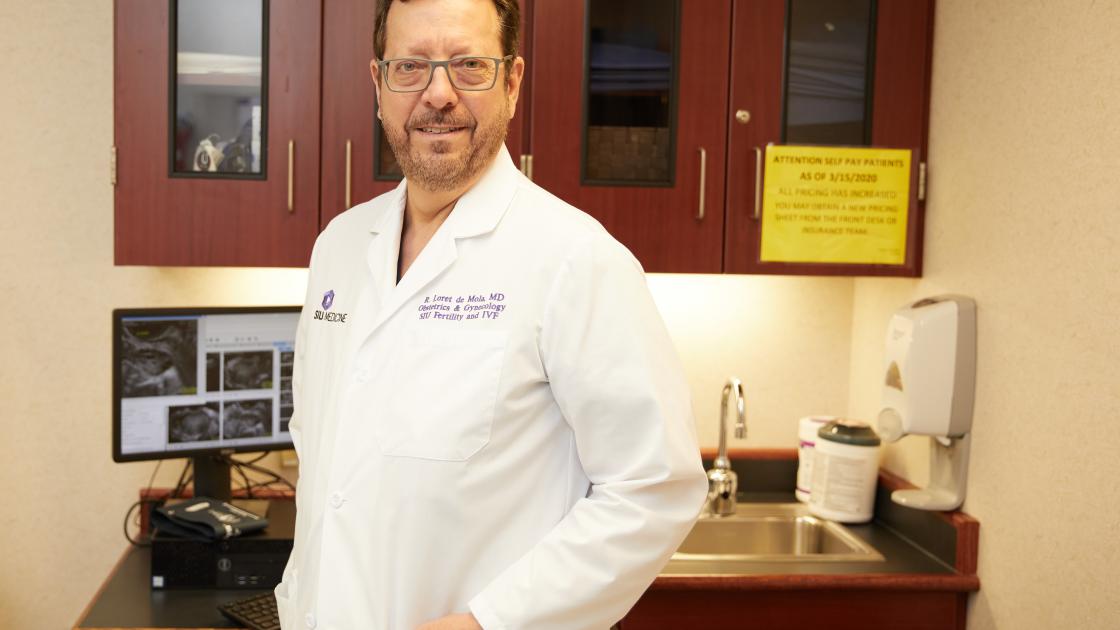
J. Ricardo Loret de Mola, MD
About me
J. Ricardo Loret de Mola, MD, serves as Professor and Chair of the Department of Obstetrics and Gynecology at Southern Illinois University School of Medicine SIU, Medical Director of HSHS St. John’s Hospital Women’s Health Programs in Springfield, Illinois. Dr. Loret de Mola’s clinical and research interests are in the care of couples with infertility, and women with endometriosis. His medical practice is focused on the care of couples who are not able to have children, as well as complex surgical disorders that require advanced minimally invasive gynecologic procedures and robotic surgery. Given his clinical interests, he founded the SIU Fertility and IVF Center, where he serves as its Medical Director, and established a highly successful fertility program with outstanding pregnancy rates. Most recently, Dr. Loret de Mola earned the Outstanding District Service Award from the American College of Obstetricians and Gynecologists (2025).
He came to SIU from MacDonald Women’s Hospital of Case Western Reserve University (CWRU) in Cleveland, Ohio, where he served as Chief of the Reproductive Endocrinology and Infertility division (2000-07). He also was medical director of the MacDonald Fertility and IVF Center and its laboratories. He previously served on CWRU’s faculty as Assistant Director of its Obstetrics and Gynecology residency program (1996-99). Previously, Dr. Loret de Mola was the director of the oocyte donor program at the University of Texas Health Sciences Center at San Antonio (UTHSCSA) (1999-2000). Dr. Loret de Mola completed a two-year fellowship in Reproductive Endocrinology and Infertility at the University of Pennsylvania (1994-1996), a residency in Obstetrics and Gynecology at CWRU (1990-1994) and an Internship in Internal Medicine at Temple University/St. Luke’s Program (1989-1990). He earned a medical degree at the Monterrey Institute of Technology (1988). Dr. Loret de Mola also completed a two-year fellowship at the Association of American Medical College’s Agency for Health Care Research and Quality (2002) and a two-year research fellowship in pharmacology at CWRU as a scholar of the American Association of Obstetricians and Gynecologists Foundation (1998).
Dr. Loret de Mola is board-certified in Obstetrics and Gynecology and in Reproductive Endocrinology and Infertility by the American Board of Obstetrics and Gynecology. His memberships include many organizations such as the Council of University Chairs of Obstetrics and Gynecology (CUCOG), Association of Professors of Gynecology and Obstetrics, American College of Obstetrics and Gynecology, Society for Gynecologic Investigation (elected member), Society of Reproductive Surgeons, Society of Reproductive Endocrinology and Infertility, and American Society for Reproductive Medicine and European Society of Human Reproduction and Embryology (ESHRE). He has served several leadership roles in national and international organizations such as ACOG, as Junior Fellow Treasurer, Vice-Chair and Chair for District V, and as a Fellow as Treasurer and Vice-Chair for the Illinois Section. In addition, he is past president of the Hispano-American Biomedical Association and vice president of the Asociacion Latinoamericana de Medicina Reproductiva (ALMER). The author of more than 100 scientific publications, presentations at scientific meetings and book chapters, Dr. Loret de Mola currently serves on several national and international editorial boards. He is a standing member of study sections at the National Institutes of Health, where he has also Chaired the Reproduction, Andrology and Gynecology (RAG) study section for several years. He has received research grants from the National Institute of Child Health and Human Development, the National Institutes of Health, the Cleveland Research Institute, UTHSCSA, Association of Professors of Gynecology and Obstetrics, American College of Obstetrics and Gynecology and various pharmaceutical companies.
Gender
Additional languages spoken
Education & training
Research
Publications
- Loret de Mola JR. Obesity and its relationship to Infertility in men and women. Obstet Gynecol Clin North Am, Obstet Gynecol Clin North Am 36(2):333-346,2009.
- Gupta S, Agarwal A, Loret de Mola JR. Meta analysis on the effect of Endometriomas on IVF Outcome. Reproductive BioMedicine Online 2006 http://www.rbmonline.com/Article/320 e-pub ahead of print on 12 June 2006
- Loret de Mola JR, Garside W, Barnhart K, Kopf G, Heyner S, Coutifaris C. Comparison of two culture systems for the in vitro maturation of mouse preantral follicles. Clin Exp Obstet Gynecol 31:15-19, 2004.
- Loret de Mola JR, Goldfarb J, Hecht BR, Babbo JC, Friedlander MA. Gonadotropins induce higher active Renin levels in the follicular fluid of normal and hyperstimulated cycles. Gynecol Endocrinol 13:155-160, 1999.
- Garside WT, Loret de Mola JR, Bucci J, Tureck RT, Heyner S. Sequential analysis of zona thickness during in vitro culture of human zygotes: Correlation with embryo quality, age and implantation. Mol Reprod Develop 47:99-104, 1997
- Loret de Mola JR, Flores JP, Baumgardner G, Goldfarb J, Friedlander MA. Elevated Interleukin-6 levels in the ovarian hyperstimulation syndrome; ovarian immunohistochemical localization of Interleukin-6 signal. Obstet Gynecol 87:581-587, 1996
- Friedlander MA, Loret de Mola JR, Goldfarb JM: Elevated levels of interleukin-6 in ascites and serum from women with ovarian hyperstimulation syndrome. Fertil Steril 60:826-33, 1993
Grants
"Development of New Therapeutic Strategies for Endometriosis" NICHHD $184,375
"Utilizing the Microbiome to Diagnose Endometriosis" Endometriosis Foundation of America $12,500
"Diabetes, Prenatal Depression and Self-Rated Health: Exploring the Mediating Role of Self-Efficacy" UIUC $30,000
Awards
- Southern Illinois University, Award of Tenure, 2007
- The American Association of Obstetricians & Gynecologists Foundation Fellowship (AAOGF) Scholar, The American Gynecological & Obstetrical Society (AGOS) 1996-1998
- The American College of Obstetricians and Gynecologists (ACOG), ACOG/Searle Pharmaceuticals-Donald F. Richardson Memorial National Prize Paper Award, 1996
- The American College of Obstetricians and Gynecologists (ACOG), ACOG/Ephraim McDowell Award for Scientific Excellence, 1st prize Junior Fellows Research Paper, District V, 1995
- Best Doctors In America
- Who's Who in America
- Who's Who in American Medicine & Healthcare
- The Charles H. Hendricks Faculty Teaching Award, Department of Reproductive Biology, Case Western Reserve University
- The American Medical Association (AMA), 1996 AMA/Glaxo Wellcome Achievement Award.
Clinical trials
Related articles

Dr. J. Ricardo Loret de Mola honored with ACOG's Outstanding Service Award

